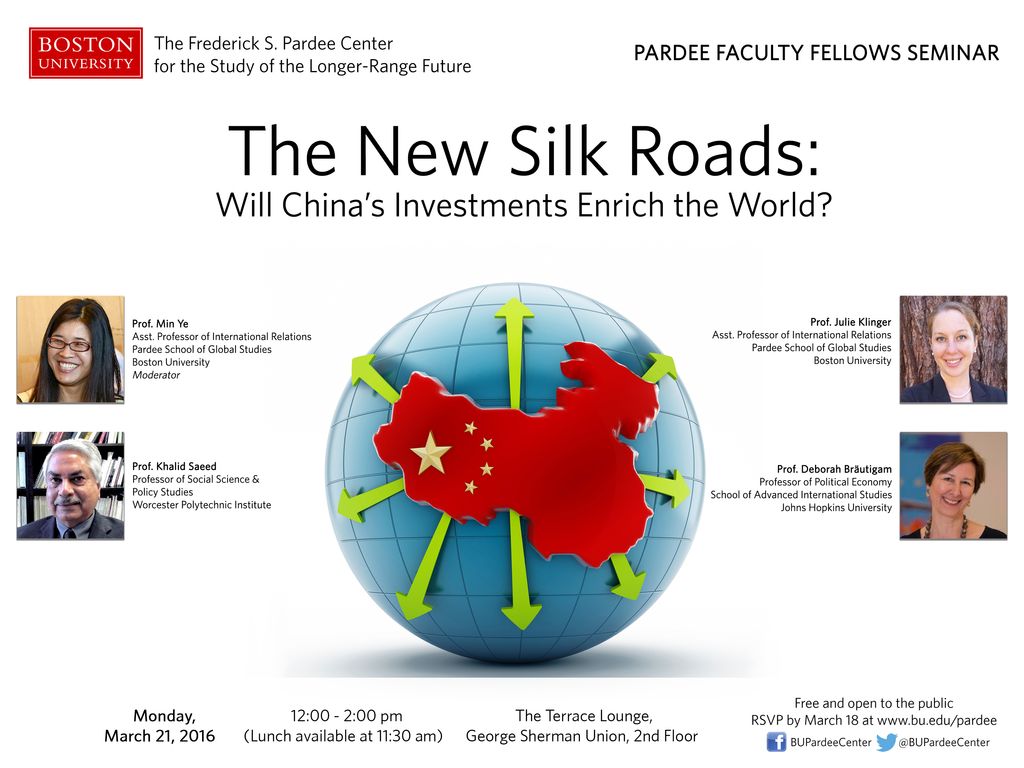The New Silk Roads: Will China’s Investments Enrich the World?
The Frederick S. Pardee Center for the Study of the Longer-Range Future will host a seminar titled “The New Silk Roads: Will China’s Investments Enrich the World?” on Monday, March 21 from 12:00 to 2:00 pm at the Terrace Lounge on the 2nd floor of the George Sherman Union.
In late 2013, China launched the “one belt, one road” initiative: the new Silk Road economic belt that connects China with central Asia and Europe and the 21st century maritime Silk Road that connects China with Southeast Asia, India, and Africa. Observers have debated the initiative’s implications for transnational investment, foreign diplomacy, and regional geopolitics.
Prof. Min Ye of the Pardee School of Global Studies will moderate a discussion featuring Prof. Khalid Saeed of the Worcester Polytechnic Institute, Prof. Deborah Bräutigam of the Johns Hopkins School of Advanced International Studies (SAIS), and Prof. Julie Klinger of the Pardee School of Global Studies.
The seminar is part of Prof. Min Ye’s work as a Pardee Center Faculty Research Fellow, which aims to establish a policy-relevant research program on the impacts of various aspects of China’s Silk Road Diplomacy in other developing countries in Asia and elsewhere.
Speaker Biographies
 Min Ye is an Asian political economist at the Pardee School of Global Studies and the academic coordinator of the Asian Studies Program at Boston University. As a Faculty Research Fellow at the Pardee Center, she is leading a project to establish a coordinated, multidisciplinary, policy-relevant program of research on the impacts of various aspects of China’s Silk Road Diplomacy in other developing countries in Asia and elsewhere.
Min Ye is an Asian political economist at the Pardee School of Global Studies and the academic coordinator of the Asian Studies Program at Boston University. As a Faculty Research Fellow at the Pardee Center, she is leading a project to establish a coordinated, multidisciplinary, policy-relevant program of research on the impacts of various aspects of China’s Silk Road Diplomacy in other developing countries in Asia and elsewhere.
Her research focuses on foreign investment and transnational immigration. Her publications include Diasporas and Foreign Direct Investment in China and India (Cambridge University Press, 2014) and The Making of Northeast Asia (coau. Kent Calder, Stanford University Press, 2010). Prof. Ye was a post-doctoral fellow at Harvard’s Fairbank Center in 2009-2010 and serves as a Public Intellectual Program fellow of the National Committee on U.S-China Relations, 2014-2016.
 Julie Klinger holds a PhD in Geography from the University of California-Berkeley and is an assistant professor of international relations at the Frederick S. Pardee School of Global Studies at Boston University. She specializes in the political economy and political ecology of strategic mineral resources in China, Brazil, and Outer Space. Her ethnographic and policy research has been funded by the National Science Foundation, the Irmgard Coninx Stiftung, and the Boston University East Asia Career Development Professorship. She has published in The Extractive Industries and Society, the Journal of Chinese Political Science, and Nueva Sociedad. Since 2010, Klinger has delivered lectures in local languages to academic and policy audiences in several cities in China, Brazil, and the United States. Her book manuscript on the global geography of the rare earth mining and prospecting is currently under review with Cornell University Press.
Julie Klinger holds a PhD in Geography from the University of California-Berkeley and is an assistant professor of international relations at the Frederick S. Pardee School of Global Studies at Boston University. She specializes in the political economy and political ecology of strategic mineral resources in China, Brazil, and Outer Space. Her ethnographic and policy research has been funded by the National Science Foundation, the Irmgard Coninx Stiftung, and the Boston University East Asia Career Development Professorship. She has published in The Extractive Industries and Society, the Journal of Chinese Political Science, and Nueva Sociedad. Since 2010, Klinger has delivered lectures in local languages to academic and policy audiences in several cities in China, Brazil, and the United States. Her book manuscript on the global geography of the rare earth mining and prospecting is currently under review with Cornell University Press.
 Deborah Bräutigam is the Bernard L. Schwartz Professor of Political Economy, Director of the International Development Program, and Director of the China Africa Research Initiative at Johns Hopkins University’s School of Advanced International Studies (SAIS). Her most recent books include The Dragon’s Gift: The Real Story of China in Africa (OUP, 2011) and Will Africa Feed China? (OUP, 2015). Before joining SAIS in 2012, she taught at Columbia University and American University. Prof. Bräutigam’s teaching and research focus on China’s overseas engagement; African development strategies; governance and foreign aid. She has twice won the Fulbright research award and is a recipient of fellowships from the Council on Foreign Relations, the Woodrow Wilson International Center for Scholars, and research grants from the UK Economic and Social Research Council (ESRC) and the UK Centre for Economic Policy and Research (CEPR). She has served as a consultant for Transparency International, the United Nations, the World Bank, DFID, GIZ, DANIDA, the African Development Bank, and USAID. Bräutigam has been a visiting scholar at the World Bank, a senior research fellow at the International Food Policy Research Institute (IFPRI), and advised more than a dozen governments on China-Africa relations. Her Ph.D. is from the Fletcher School of Law and Diplomacy, Tufts University.
Deborah Bräutigam is the Bernard L. Schwartz Professor of Political Economy, Director of the International Development Program, and Director of the China Africa Research Initiative at Johns Hopkins University’s School of Advanced International Studies (SAIS). Her most recent books include The Dragon’s Gift: The Real Story of China in Africa (OUP, 2011) and Will Africa Feed China? (OUP, 2015). Before joining SAIS in 2012, she taught at Columbia University and American University. Prof. Bräutigam’s teaching and research focus on China’s overseas engagement; African development strategies; governance and foreign aid. She has twice won the Fulbright research award and is a recipient of fellowships from the Council on Foreign Relations, the Woodrow Wilson International Center for Scholars, and research grants from the UK Economic and Social Research Council (ESRC) and the UK Centre for Economic Policy and Research (CEPR). She has served as a consultant for Transparency International, the United Nations, the World Bank, DFID, GIZ, DANIDA, the African Development Bank, and USAID. Bräutigam has been a visiting scholar at the World Bank, a senior research fellow at the International Food Policy Research Institute (IFPRI), and advised more than a dozen governments on China-Africa relations. Her Ph.D. is from the Fletcher School of Law and Diplomacy, Tufts University.
 Khalid Saeed is a Professor of Economics and System Dynamics at Worcester Polytechnic Institute, where he also directs the system dynamics programs. He has authored two books and numerous articles on economic, organizational and political agendas applying his expertise in system dynamics. He has worked on consulting and training projects among other organizations, with Veteran’s Administration, Health Resources and Services Administration, United Nations, Asian Development Bank, World Business Council for Sustainable Development, Booz Allen Hamilton and McKinsey & Company. A recipient of the Jay Forrester Award and a PhD from MIT, he has served as President of System Dynamics Society, Associate Editor of System Dynamics Review, and Chair of Jay Forrester Award Committee.
Khalid Saeed is a Professor of Economics and System Dynamics at Worcester Polytechnic Institute, where he also directs the system dynamics programs. He has authored two books and numerous articles on economic, organizational and political agendas applying his expertise in system dynamics. He has worked on consulting and training projects among other organizations, with Veteran’s Administration, Health Resources and Services Administration, United Nations, Asian Development Bank, World Business Council for Sustainable Development, Booz Allen Hamilton and McKinsey & Company. A recipient of the Jay Forrester Award and a PhD from MIT, he has served as President of System Dynamics Society, Associate Editor of System Dynamics Review, and Chair of Jay Forrester Award Committee.
